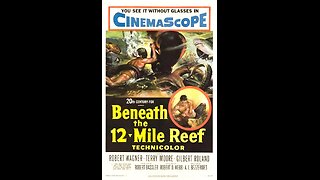Premium Only Content

A Canterbury Tale (1944) | Directed by Michael Powell & Emeric Pressburger (The Archers)
Title: A Canterbury Tale
Directors: Michael Powell, Emeric Pressburger (The Archers)
Release Year: 1944
Genre: Comedy, Drama, Mystery
"A Canterbury Tale" is a unique and somewhat unconventional film that combines elements of comedy, drama, and mystery. The story is set during World War II and follows three characters—Alison Smith (played by Sheila Sim), Bob Johnson (played by Dennis Price), and Peter Gibbs (played by John Sweet)—who find themselves in the English village of Chillingbourne.
The narrative is loosely inspired by Geoffrey Chaucer's "The Canterbury Tales." The three protagonists, representing various walks of life, arrive in the village and become involved in a mystery. A mysterious figure known as the "Glue Man" pours glue into the hair of young women in the village at night. The three characters, along with a local magistrate (played by Eric Portman), embark on an investigation to uncover the identity of the Glue Man.
As the characters explore the village and its surroundings, the film delves into the lives and relationships of the residents, weaving together a tapestry of stories and experiences. The narrative emphasizes the idea of a pilgrimage, both in the literal sense of the characters' journey and in the broader metaphorical sense of life's journey.
Themes:
1. Pilgrimage and Identity: The characters' physical journey to Canterbury becomes a metaphor for their personal and spiritual journeys, exploring themes of identity, purpose, and self-discovery.
2. Community and Connection: The film explores the sense of community in a small English village during wartime, highlighting the diverse characters and their interconnected lives.
3. Cultural Heritage: Drawing inspiration from Chaucer's medieval tales, the film reflects on the continuity of English cultural heritage and the impact of war on the nation's identity.
Visual Style:
Directed by The Archers, known for their visually distinctive and innovative filmmaking, "A Canterbury Tale" features beautiful cinematography and captures the picturesque English countryside. The film is also known for its dreamlike sequences and subtle use of symbolism.
Legacy:
While "A Canterbury Tale" wasn't a commercial success upon its initial release, it has gained appreciation over the years for its unique storytelling, atmospheric cinematography, and the thematic depth that emerges from the seemingly simple mystery plot. The film is now considered a classic and is admired for its contribution to British cinema during the wartime era.
-
 1:41:55
1:41:55
Classic Films & Movies Archive
4 days agoBeneath the 12-Mile Reef (1953) | Directed by Robert D. Webb
110 -
 LIVE
LIVE
I_Came_With_Fire_Podcast
11 hours ago"Veteran Health, Military Culture, and American Exceptionalism" with Matt Kenney
924 watching -
 23:21
23:21
Simply Bitcoin
1 day ago $8.19 earned$1M Bitcoin in 2025? | Trump's Plan to End the Fed Revealed!
44.7K18 -
 17:19
17:19
SLS - Street League Skateboarding
17 days agoTop Moments from the Men’s Super Crown Final! Nyjah Huston, Giovanni Vianna and Gustavo Ribeiro 👑
26.8K -
 LIVE
LIVE
Major League Fishing
2 days agoLIVE! - Bass Pro Tour: Stage 1 - Day 3
773 watching -
 47:00
47:00
vinndoggradiousa
4 days agoBYE LEGACY MEDIA guest/ Sam Anthony of YourNews.com
208 -
 13:55
13:55
Clownfish TV
13 hours agoOrcs REMOVED from Dungeons & Dragons New Monster Manual?!
4914 -
 15:38
15:38
Chris From The 740
4 hours agoThe EAA Girsan Match X 2311 : Premium Features, Unbeatable Value!
581 -
 14:23
14:23
Degenerate Jay
1 hour agoPeople Forgot What Metal Gear Solid Is?
562 -
 1:01:23
1:01:23
FamilyFriendlyGaming
15 hours ago $2.49 earnedCat Quest III Episode 14
15.6K